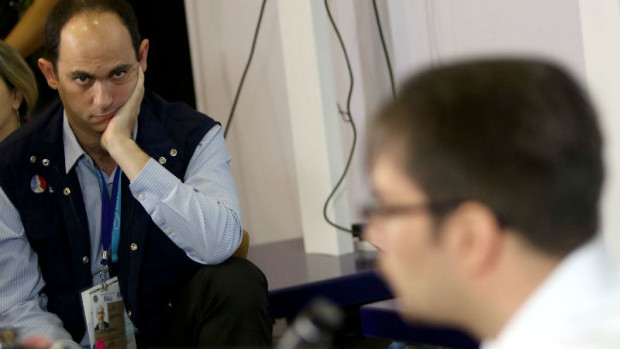DOJ reverses dismissal of Cybercrime case vs Comelec, Smartmatic execs

Smartmatic Project Director and General Manager Elie Moreno listens as Project Manager Marlon Garcia explains how they change the script during press conference in Commission on Election Headquarters,Philippine International Conventionn Center, Pasay City.
INQUIRER PHOTO / RICHARD A. REYES
The Department of Justice (DOJ) has reversed the findings of the Manila Prosecutors office that dismissed the case for violation of the Cybercrime Prevention Act of 2012 filed against the officials of the Commission on Elections (Comelec) and Smartmatic officials.
In a 42-page resolution dated June 2, 2017 signed by Justice Undersecretary Deo Marco, the DOJ approved the filing of cases for violation of Sections 4 (a)(1), 3 and 4 of Republic Act 10175 or the Cybercrime Act of 2012 against Comelec IT experts Nelson Herrera, Frances Mae Gonzales and Rouie Penalba and Smartmatic head of technical support team Marlon Garcia and his subordinates Mauricio Herrera and Neil Baniqued.
The DOJ, however cleared Smartmatic project director Elie Moreno.
Section 4 (a)(1) of RA 10175 penalizes the access of a computer system without any authority while Section 3 penalizes the intentional and reckless altering of computer data.
On the other hand, Section 4 penalizes the act of hindering or interfering with the functions of a computer and computer network by inputting, deleting and altering computer data and programs, without any right or authority.
“The Office of the City Prosecutor of Manila is directed to file the necessary Information for violations of Sec. 4(a)(1), (3) and (4) of the Cybercrime Prevention Act against respondents before the appropriate court and to report the action taken within 10 days from receipt, hereof,” the resolution said.
The DOJ issued the resolution following a petition for review filed by former Abakada Representative Jonathan Dela Cruz.
He said the Manila Prosecutors Office committed reversible error in dismissing the case against Marlon Garcia, head of the Smartmatic technical support team; Elie Moreno, Smartmatic project director; Neil Baniqued, Smartmatic team member; and Rouie Peñalba, Comelec information technology officer, for insufficiency of evidence.
The prosecutors said Dela Cruz failed to present evidence that the tweaking of the script of the transparency server has compromised the integrity of the elections or caused widespread anxiety. The OCP-Manila added that there was also no evidence to prove that there was intention on the part of the respondents to compromise the transparency server and cause widespread anxiety.
But Dela Cruz said the Cybercrime Prevention Act, being a mala prohibita, intent or good faith is immaterial.
“The mere commission thereof amounts to a breach in the confidentiality, integrity and availability of computer data and systems,” he said.
Dela Cruz further stated that by alleging that there was no damage caused by Respondent in changing the script, the OCP-Manila may have overlooked the fact that the change was committed without right or authority as declared by Comelec Commissioners, which is an act punishable under the Cybercrime Law.
Enye letter controversy
The Comelec acknowledged a lapse in protocol as the political parties were informed about the adjustment only after Smartmatic project manager Marlon Garcia had changed the special character “?” that appeared in the names of certain candidates to “ñ.” Smartmatic is the technology provider for the elections.
The DOJ, in its resolution, said respondents failed to present evidence that it was given authority by the Comelec en banc allowing them to change the script in the transparency server.
“This was not only against protocol but was also patently illegal. Marlon Garcia, himself, admitted that he made the change in the script of the transparency server as advised by Mauricio Herrera. Notably, it was Comelec Information Technology expert Rouie Peñalba who notified the Smartmatic personnel,” the resolution said.
It added that Penalba could not absolve himself of the crime because of his inconsistent statements, adding that at first he admitted that he instructed Garcia to change the system and then he changed his story and claimed that Smartmatic was authorized to access the system.
“Rouie Penalba, along with Frances Mae Gonzales and Nelson Herrera, as Comelec representatives assigned to the PPCRV Center and holding one half of the password to access the system, acquiesced to the access or interference effected by the Smartmatic personnel, beyond their authority,” the resolution said.
The resolution also dismissed the arguments of the Smartmatic personnel that what was carried out was merely a “cosmetic change” that did not affect the elections adding that RA 10175 is a special law and as such, it did not require criminal intent where the acts are prohibited by reason of public policy.
It stressed that the “mere perpetration thereof, constitute an offense against the confidentiality, integrity, and availability of computer data and systems. “
The DOJ likewise faulted the respondents for accessing the transparency server to change the same without notifying the Comelec en banc and for failing to report the script change after it was carried out.
It also took note that 24 hours have lapsed before a report was made and alerted the parties.
Meanwhile, Atty. Vic Rodriguez, spokesperson of former Senator Ferdinand “Bongbong” R. Marcos Jr. said the DOJ resolution “is a most welcome development because the unauthorized change they introduced in the script of the transparency server indeed undermined the credibility of the elections.”